- Home
- Elmore Leonard
The Moonshine War Page 17
The Moonshine War Read online
Page 17
"I guess you can see the point of it though," Son said.
"Yes, sir, if you don't take the whiskey out yourself, nobody does. But things are different now, Son. You got a partner."
"How does that make it different?"
"You won't need to think about blowing up your whiskey. I mean our whiskey." Long stooped at the cupboard again. He took a spring knife from his pocket, reached in and cut the wire connected to the plunger. "So you won't blow up our business when I'm not looking," Long said. He lifted out the box, dropped it, and proceeded to smash it into pieces with the stock of his BAR "Now then," he said, "let's figure out how we're going to run old Dr. Taulbee."
The only thing they decided for sure was that after dark Lowell Holbrook would slip out through the hollow and run home. If, Frank Long said, he wasn't afraid of being out in the dark. Lowell said he wasn't afraid of the dark, that wasn't the reason he wanted to stay. But Son told him no, he had done a brave thing, but he wasn't going to stay here to get shot at; it wasn't his affair. Frank Long told Lowell he was the best bellboy he had ever seen and gave ten dollars for bringing his suitcase.
Son, with the 12-gauge, saw Lowell across the yard. Coming back, Son approached the barn from the blind side, slipped through the fence rails and got up close to the building and pressed his ear against a seam in the boards. He listened for about ten minutes before going in and feeling his way to the car. He waited again, briefly, before striking a match. There were blood stains on both the front and rear seats, but no sign of the three men. Son went out the back, the way they would have left, and looked out over the open pasture in the moonlight, at the brush shadows and the dark mass of trees beyond. Then he circled back, around the barn to the house.
Later in the night, listening, watching the slope, Son touched Long's shoulder and pointed out into the darkness. "Straight up there," he said. "You know where the grave would be?" Long said he thought he did. "Then put your gun on it," Son told him. "Right above it."
Son put his hand on the light switch. "You ready?" As Long answered, Son turned it on.
A hundred yards away on the hillside, the grave and the light post and a moving figure were illuminated and the BAR hammered through the darkness until the figure disappeared and the light went off as Son flicked the switch.
"Buddy," Long said, "that's a good idea. It's too bad we can't pull it more than once."
"Maybe we can." Son was staring out at the darkness. One idea was leading to another, an idea that could end this; but he said no more to Frank Long.
Chapter Fifteen.
Friday morning, June 26, Dr. Taulbee made a decision: this would be the last day he could afford to sit out here in the piney woods, playing war.
It would be simple to outwait the man and starve him out. It had seemed simple before. But now, he realized, that could take a month for all anybody knew. Dr. Taulbee wasn't financing an extended campaign, or performing for the audience over on the ridge, or taking a chance that word of the siege wouldn't get in the county newspapers. That happened and before he knew it, the federal people would be driving up. No thank you.
He had been out here two days and two nights. To show for it he had four dead, another who probably wouldn't last the day, two more shot up, two cars out of commission, and eight men left who gave him sullen stares, waiting for him to think of something. He asked them, don't you want to get that boy's whiskey? Don't you want to get Frank Long? All right, a hundred-dollar bonus to the man that shoots him.
But he still had to convince them he knew what he was doing. He had to maintain their confidence. And, Jesus, if he didn't do another thing he had to keep them busy, away from the boy dying with the bullet in his chest. So this morning he kept six of them peppering away at the house with rifles while the other two drove to town to get Miley. He might as well keep Miley busy too. He had an idea for getting his boys in the mood for an all-out fight and needed Miley to help him.
The image Dr. Taulbee presented to the world that Friday morning was one of relaxed confidence. He sat in a wicker-back rocking chair on the porch of Son Martin's still, smoking a cigar, rocking gently, letting his tough boys from Louisville know he had the situation under control.
When Miley walked into the yard, looking around, frowning in the sunlight, she said, "What am I suppose to do out here? I can't shoot a gun and I never was a campfire girl."
Dr. Taulbee smiled at her and said, "As soon as you finish being a little sour-mouth smart-ass, I'll tell you."
Miley shrugged and waited, and Dr. Taulbee said, what she was going to do, she was going to march down the hill and tell Son Martin he had one last chance to give up and save his life.
And, if he acted at once on this offer, he would be paid a dollar a gallon for his whiskey.
Miley thought about it, picturing Son Martin. "And what do I do when he says no?"
"You come on back here."
"If you know what he's going to say, then what's the good of asking him?"
"Because of what you say when you get back."
"What is it I say?"
"In front of the men, you tell them all three of them down there are shot up and in pain, just barely dragging theirselves around with blood all over everything. They look to you like they won't last till night."
"Yeah," Miley said, "then what?"
"Then our brave boys, smelling easy victory, storm the house to finish them off."
Miley shook her head. "You sure are a thinker."
"You cute thing," Dr. Taulbee said, "give us a kiss before you go."
"They all out there again," Aaron said. "More than yesterday."
Son looked out across the pasture to the cars parked on the open ridge. "Come to see the show."
"I don't understand them people." Son made no comment.
"Something else I don't understand," Aaron said. "Why you told him about the grave." "He figured it out."
"He was guessing,"
"But he was right. Whether I said anything or not, he was right. If he gets out of this he'll dig for the whiskey and find it. But we can't shoot him because he knows where it is, can we?"
"I don't know," Aaron said. "Maybe you can't."
Son looked over at him, then at the ceiling. "There's something we can do if he stays up there long enough." He edged closer to Aaron at the window. "The light switch--"
"Hey, what're you two whispering about?" Frank Long's voice came from the hole drilled in the ceiling. Son's eyes raised. "We were just talking about you, Frank. Arguing which one of us is going to shoot you."
They heard him laugh. "Son, you wouldn't shoot an old buddy."
"You ain't an old buddy of Aaron's."
"What're you talking about?" Long said. "Hey, Aaron, I meant to tell you. I'm giving you a cut of the whiskey take, boy, so don't be having any dark thoughts. You hear?"
Looking up at the ceiling, Aaron didn't answer. He said to Son, "You want him with you?"
"No."
Son had made up his mind. He could say yes, thinking about the whiskey, the work and the years that had gone into it. He could say, all right, Frank Long is a partner. Finish this with his help. Maybe. Get the whiskey out and sell it with half the county knowing and watching and split the profit with a crooked federal agent he used to know in the Army. Do all that before another gang like Dr. Taulbee's heard about the whiskey and came down with their guns to start another war. Or before the Prohibition agents heard and started busting stills all over again. Forty-five hundred gallons of eight-year-old whiskey was a good idea at one time. Now it was a dream a man would have with his head under the covers, while he wished all the trouble it caused would go away.
He knew he wasn't going to drink forty-five hundred gallons himself and it didn't look like he was going to sell the whiskey. So if he didn't want anybody else to have it, there was only one thing left to do.
Blow it up. Splice the dynamite wire to the electrical system and turn on the switch.
If he could think
of a way to keep Frank Long busy while he made the splice.
Walk up to him and knock him cold; that was one way. Hit him with a gun stock or a hunk of kindling if he had to. Then wire the charge and blow it and hope Dr. Taulbee would look at the smoke and go home.
That was the trouble. Son couldn't be sure what Dr. Taulbee would do. He was a scary son of a bitch, with his big smile. He might look at the smoke and go right out of his head.
Frank Long came downstairs with the BAR under his arm. "What I want to know," he said, "is who you expect will be coming next? Look-it out there."
Miley looked up from the porch steps to the house. "You got a ladder or is somebody going to pull me up?" She could see Son in the window. She didn't know Long was here until he opened the door and stepped out. When he leaned down to give her a hand, Miley continued to stare at him. Finally she let herself be pulled up. On the porch she brushed at the front of her skirt before looking at him again.
"It doesn't appear you're being held for ransom."
"I switched over, honey, seeing the error of my ways. That's a terrible person you're playing house with."
"He must have thrown you out," Miley said.
Long grinned at her. "How about yourself?"
"I've come with a message."
"Well, come in, honey; we want to hear it."
Miley looked around the room before her gaze settled on Son Martin. "You look all right to me," she said.
"We're getting along." Son realized he was glad to see her. He couldn't help smiling and she smiled back at him.
"Emmett says if you all want to quit now he'll pay you a dollar a gallon for the whiskey." "We're asking five," Long said.
"We are." Miley raised her eyebrows. "We fit ourselves right in, don't we?"
"You want to be on our side?"
"It's a thought, isn't it?" Miley looked at Son. "I doubt if he can pay your price."
"Even if he could," Son said, "and was willing, the whiskey's not for sale. Tell him that. Not for a dollar, not for ten dollars."
"So you're still the one to talk to," Miley said.
"Tell him if he wants it he'll have to come get it."
"I expect he will. Though he's running out of people."
"How many we get?" Long asked her.
"Four, I think. Maybe five by now."
"Hey, Son, that ain't bad, is it?" Long looked at Miley again. "You sure you don't want to be on our side?"
"I'd have to think about it," Miley said. "It looks to me like the odds are still way against you."
"But changing all the time."
"That's true." Miley nodded. "But I still think he's going to win."
"I'll tell you what," Long said. "You stay here awhile with us and see how you like it."
"If I don't get back he'll send them looking for me."
"He might at that. What if we tell him we'll shoot you if he doesn't clear out?"
Miley laughed. "Are you kidding?"
"That's what I thought," Long said. "So we'll just keep you here and won't say anything and see what happens."
Son almost overruled him. He almost took Miley by the arm to push her outside; but he saw something--the way Long was openly looking at her body, peeling her clothes off with his gaze. Son went over to the stove. "You're going to stay," he said, "you might as well fix us some thing to eat."
Miley followed him over. "If that's what you want." Long's eyes were on the nice little can moving in the tight skirt. Son noticed that too.
"I'd like to see them run in there with the cars again," Bud Blackwell said. "Jesus, the one car went right through the barn."
"You hear that gun they got?" Virgil Worthman said.
"Like a machine gun." Bud pulled the weed stem from his mouth and made a noise like a machine gun firing.
Lowell Holbrook looked over at him. "It was a BAR rifle," he said, "belongs to Frank Long. Doesn't anybody know a BAR rifle when they hear one?" Gazing off at the house he walked away from them, like he wanted to study the house from a different angle. He knew the people were watching him.
Let them wonder what he was thinking. He had been in that house all yesterday afternoon until dark and he knew things nobody else knew. Last night and earlier this morning, nobody would leave him alone, all the questions they asked. Why had he gone down there? Wasn't he scared? How were they doing? Had any of them been shot? Lowell told them the man was a guest of the hotel; the man had wanted his car and his suitcase, so he delivered them. That's all there was to it.
Now, every once in a while, somebody would ask what he thought was going to happen. Lowell would study the house with his cool gaze and say, "Don't worry about Son Martin." A couple of times he wanted to add, "If you're so worried, why don't you go help him?" But he never did. If anybody wanted to help Son, but didn't do anything about it, it was their own personal business. A person knew what he should do and what he shouldn't do.
Lowell had a feeling for a while that Mrs. Lyons was going to do something. It had surprised him to see her drive up this morning. He would watch her when he remembered her being here. She stood by herself most of the time. Once she had asked him if he thought Son was all right and he gave her the answer, "Don't worry about Son Martin." She had looked awful worried; maybe it was true they were going to bed together. She had talked to other people, maybe trying to get them to help. But Lowell didn't see anybody getting any guns out of their cars. After a while Mrs. Lyons sat down on the corner of a blanket that a couple of ladies had spread. Lowell watched her holding a cup as one of the ladies poured coffee in it from a Thermos.
Everybody was sure prepared today. They had picnic baskets and coffee and Coca-Colas, blankets and folding chairs and canvas awnings built out from some of the cars. There was even a cookfire for anyone who wanted to fix a hot meal.
"Somebody ought to sell tickets," Lowell said to Mrs. Lyons, and got a strange, sorrowful look from her, like she might be going to cry. Though she didn't.
The heavy-set guy, Carl, came over through the brush to tell Dr. Taulbee there was no sign of her yet, she was still in the house.
"They think they're pulling a stunt," Dr. Taulbee said. He blew a stream of cigar smoke toward the edge of the roof over the porch. "We start down there shooting and they tie her to the front door."
"If that was to happen, what do we do?" the man asked.
"You'd keep shooting."
"We been shooting, mister, for two days."
"Now when was it," Dr. Taulbee said, "somebody told me he was going to bring the nigger out dead and the other with his hands in the air? It seems to me it was the night before last. Well, buddy, I have been waiting for that to happen. I been watching you hotshots with your tommy guns and high-powered rifles, but I haven't seen any results. I don't know with all the shooting you been doing one of them is even nicked. Can you tell me that? If all this shooting for two days has hit anybody? No, you can't, buddy, because you haven't been close enough to that house to find out. Now tell me again how you're going to bring them out."
Carl's thick shoulders were hunched. He stood sullenly, looking up at Dr. Taulbee, who was rocking the chair slowly back and forth. "We'll get them out," the man said.
"Yes, I know you will," Dr. Taulbee said. "Sometime. Tell me something, is there any hay in that barn?"
"Plenty of hay."
"And there's a car in the barn?"
"That's right."
"If you were to get down to that barn just as it's getting dark--start the car up and get it loaded with nice dry hay."
"Yeah?" The man's sullen expression came alive then. "Set the hay afar and run the car into the house!"
"That'd bring them out, wouldn't it?" "Goddamn if it wouldn't."
"Buddy," Dr. Taulbee said. "I think you got an idea."
"Miley," Frank Long said, stretching as he got up from the table, "You ain't much at the stove; but then a girl can't be an expert at everything, can she?"
Her eyes moved to Son at the window.
"Some people like my coffee."
"Some hill boys will drink anything." Long grinned. "Hey, Son, I'm just kidding you. You got fine taste and good grub. I'll sit at your table any time."
Son looked over. "I'd appreciate you more at a window. You going back upstairs?"
"I guess I better."
"Well, see you later then."
Long reached for his BAR leaning against the table, then hesitated. "Hey, Miley, why don't you come up and keep me company?"
"I was going to do the dishes," she said, looking over at Son again.
"You can do them later. Son, you don't care if she does them later, do you?"
Crouching at the window, waiting for Long to get upstairs, Son shook his head. "I don't care."
"Honey, you can stretch out on the bed if you want, take a little rest."
"I'll bet," Miley said.
"What do you mean by that?" Long's tone was meant to sound offended.
"Oh come on," Miley said then, "get your gun and let's go up."
Watching the pasture and the hillside--and the light post far up on the slope marking the grave--Son listened to them mount the bare wooden stairs. He heard them in the room, the floor boards creaking. He heard Miley laugh. Long's voice came to them through the drilled hole in the floor. "Keep a close watch now, you hear?"
Son didn't raise his eyes. He said, "We hear," and waited in the silence of the room. He waited several minutes before glancing at Aaron who crawled over and put a hand on the Springfield, holding it on the window sill, as Son moved to the bullet-shattered opening in the wall and worked quickly with his knife, cutting the line to the light post and splicing the end of the dynamite line to the wire that led from the switch down to the battery-powered electrical system. He covered the opening with the board Long had pulled loose, then removed it again. Long might notice the board and wonder why it had been put back. Son reached for a chair. He set it against the opening, then put his .38 on the chair with a box of cartridges, as if he placed the chair close to have the gun within reach.

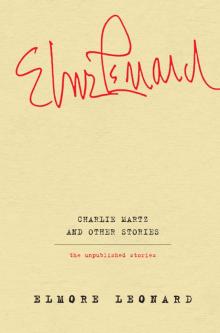 Charlie Martz and Other Stories: The Unpublished Stories
Charlie Martz and Other Stories: The Unpublished Stories Elmore Leonard's Western Roundup #2
Elmore Leonard's Western Roundup #2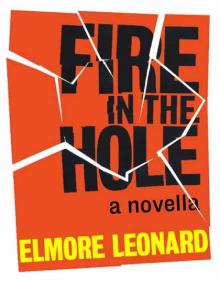 Fire in the Hole
Fire in the Hole Tishomingo Blues (2002)
Tishomingo Blues (2002)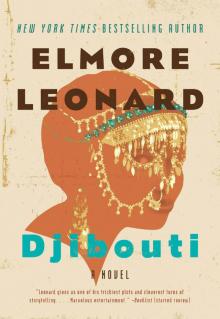 Djibouti
Djibouti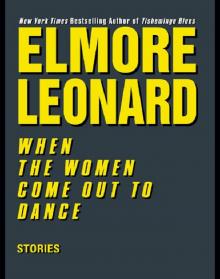 When the Women Come Out to Dance: Stories
When the Women Come Out to Dance: Stories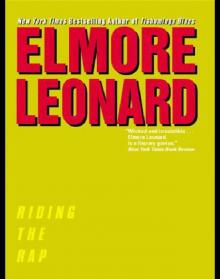 Riding the Rap
Riding the Rap Moment of Vengeance and Other Stories
Moment of Vengeance and Other Stories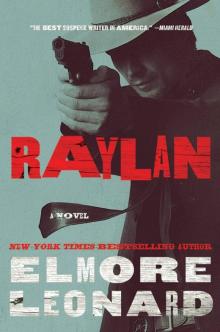 Raylan
Raylan Touch
Touch Mr Majestyk
Mr Majestyk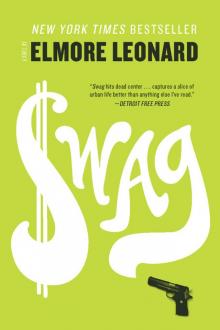 Swag
Swag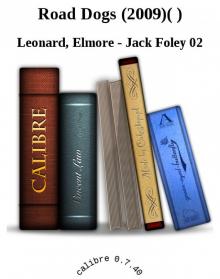 Road Dogs
Road Dogs La Brava
La Brava The Hot Kid
The Hot Kid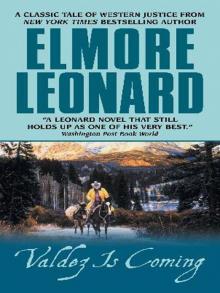 Valdez Is Coming: A Novel
Valdez Is Coming: A Novel Be Cool
Be Cool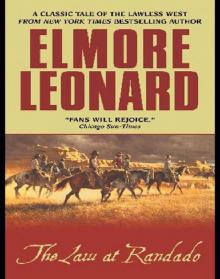 The Law at Randado
The Law at Randado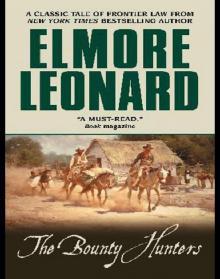 The Bounty Hunters
The Bounty Hunters When the Women Come Out to Dance
When the Women Come Out to Dance 310 to Yuma and Other Stories (1953)
310 to Yuma and Other Stories (1953)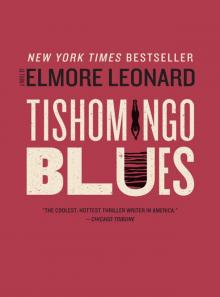 Tishomingo Blues
Tishomingo Blues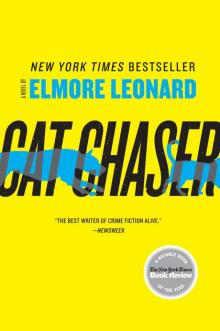 Cat Chaser
Cat Chaser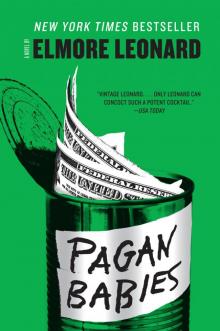 Pagan Babies
Pagan Babies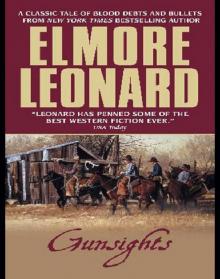 Elmore Leonard's Western Roundup #1
Elmore Leonard's Western Roundup #1 52 Pickup
52 Pickup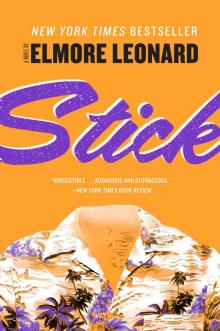 Stick
Stick The Moonshine War
The Moonshine War Valdez Is Coming
Valdez Is Coming City Primeval
City Primeval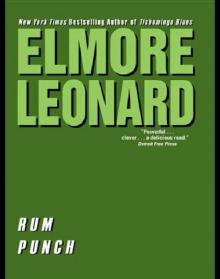 Rum Punch
Rum Punch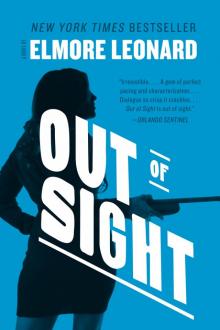 Out of Sight
Out of Sight Naked Came the Manatee (1996)
Naked Came the Manatee (1996)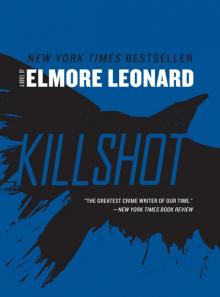 Killshot
Killshot Cuba Libre
Cuba Libre Forty Lashes Less One
Forty Lashes Less One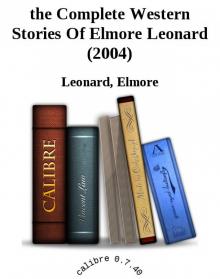 The Complete Western Stories of Elmore Leonard
The Complete Western Stories of Elmore Leonard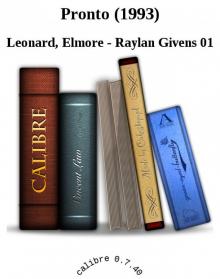 Pronto
Pronto Split Images
Split Images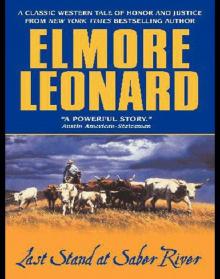 Last Stand at Saber River
Last Stand at Saber River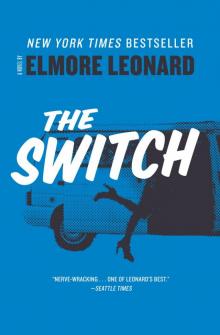 The Switch
The Switch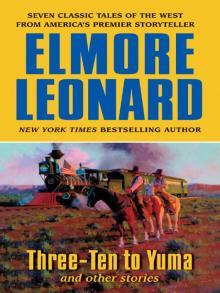 Three-Ten to Yuma and Other Stories
Three-Ten to Yuma and Other Stories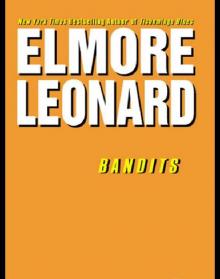 Bandits
Bandits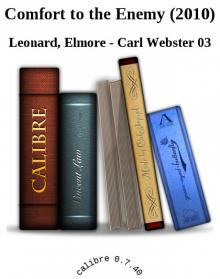 Comfort to the Enemy and Other Carl Webster Stories
Comfort to the Enemy and Other Carl Webster Stories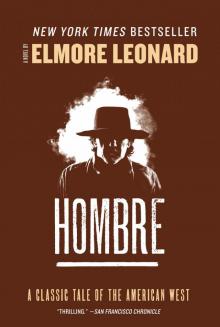 Hombre
Hombre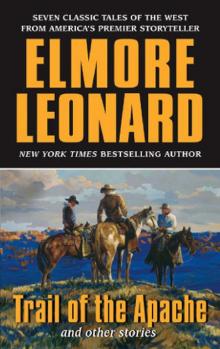 Trail of the Apache and Other Stories
Trail of the Apache and Other Stories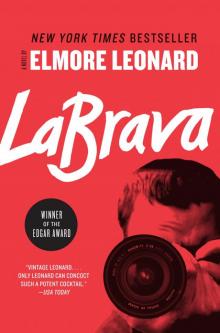 LaBrava
LaBrava Gold Coast
Gold Coast Jackie Brown
Jackie Brown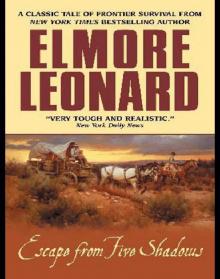 Escape From Five Shadows
Escape From Five Shadows Karen Makes out (1996)
Karen Makes out (1996)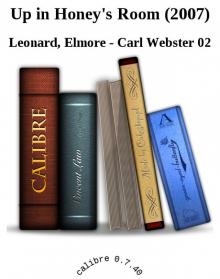 Up in Honey's Room
Up in Honey's Room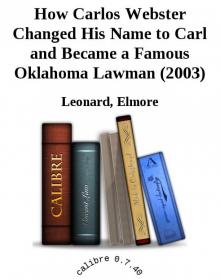 How Carlos Webster Changed His Name to Carl and Became a Famous Oklahoma Lawman (2003)
How Carlos Webster Changed His Name to Carl and Became a Famous Oklahoma Lawman (2003)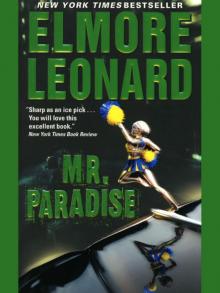 Mr. Paradise
Mr. Paradise The Hunted
The Hunted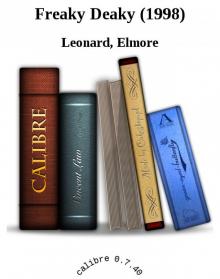 Freaky Deaky
Freaky Deaky Louly and Pretty Boy (Ss)
Louly and Pretty Boy (Ss)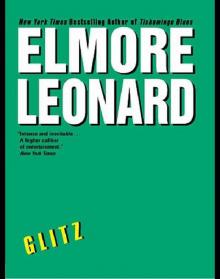 Glitz
Glitz A Coyote's in the House
A Coyote's in the House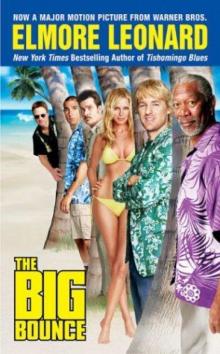 The Big Bounce jr-1
The Big Bounce jr-1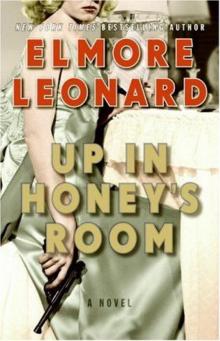 Up in Honey's Room cw-2
Up in Honey's Room cw-2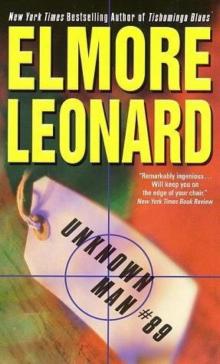 Unknown Man #89 jr-3
Unknown Man #89 jr-3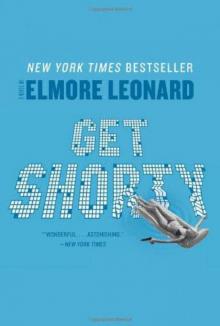 Get Shorty: A Novel cp-1
Get Shorty: A Novel cp-1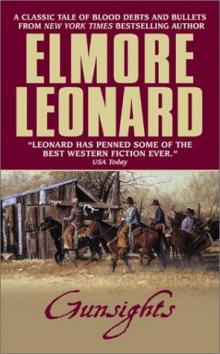 Gunsights
Gunsights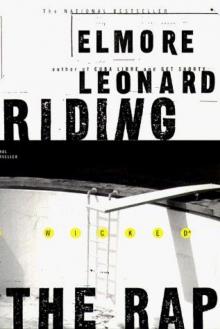 Riding the Rap rg-2
Riding the Rap rg-2